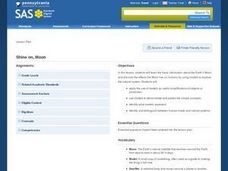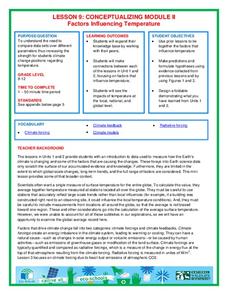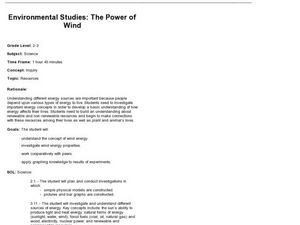Curated OER
Protecting Treasures
Students explore electricity by creating an alarm. In this circuitry activity, students analyze a diagram of a circuit based alarm which detects sunlight. Students utilize electrical equipment to recreate the circuit and practice using...
Curated OER
Shine On, Moon
Students explore space science by conducting an experiment in class. In this Moon instructional activity, students define a list of space science vocabulary and read the book The Moon. Students utilize shoeboxes and string to conduct a...
Curated OER
Mini Rockets
Students explore gases. For this chemical energy lesson, students will observer chemical reactions and infer a conclusion about reaction producing gasses.
Curated OER
Radiation Budget
Pupils solve the mathematical word problems by looking at the Earth's Energy Budget Diagram. They will work in small groups and then develop their own unique math problems from the diagram and share with the class.
Curated OER
Greenhouse in a Bottle
Young atmospheric scientists create models of an atmosphere with and without clouds to determine the effect of cloud cover on Earth's temperatures, as well as figuring out whether dark or light surfaces absorb more energy. You may wish...
Curated OER
Seasons and Cloud Cover, Are They Related?
Young scholars use NASA satellite data to correlate cloud cover over Africa to the solar declination.
Curated OER
9th Grade
Ninth graders discuss the principal source of energy entering the marine ecosystem. They name some of the autotrophs at the Maui Ocean Center. Students name some of the heterotrophs at Maui Ocean Center. They are taught that plants are...
Curated OER
Light It Up
Students study day-lighting and other types of light bulbs that are used for energy efficiency. In this engineering lesson students study the light bulb parts and the light wavelength.
Curated OER
Make a Sundial
Pupils explore space science by conducting a sun experiment in class. In this time telling lesson, students discuss how the sun sits in our sky at exact times each day and how astronomy is based on our perspective of the solar system....
Curated OER
Gallery Walk Questions on Earth's Radiation Balance
Questions that can be used in a lesson on Earth's radiation balance are suggested in this resource. It is not a lesson plan, per se, but it is a list of questions for stations within a "Gallery Walk" lesson. The link to how Gallery Walks...
Curated OER
Craters!
Eighth graders examine the formation of craters. For this craters lesson, 8th graders discover the various energies involved in the formation of a crater, where you can find a crater in the Solar System, and observations of craters on...
Curated OER
What Makes Up the Solar System?
In this solar system worksheet, students will fill in the blanks for 5 statements in this graphic organizer based on the objects found in space that make up the solar system.
Curated OER
Studying Shadows
Students measure shadows and explore the altitude of the sun. In this sun lesson students will graph the length of shadows and solar altitude against time.
Curated OER
Comets
Students explore the nature and composition of a comet. They research comet facts, legends, and myths. They identify different types of comets and describe what happens to a comet as it travels closer to the Sun.
Curated OER
Food Chains and Webs--- "What's for dinner?"
Students study food chains and how the organisms are linked. In this investigative worksheet students answer food chain questions, and fill out several worksheets.
Curated OER
Heat and Color
Sixth graders conduct a simple experiment to explore the ways that color can affect heat transfer. They review the three ways that heat can transfer: conduction, convection and radiation.
Curated OER
Blinded by the Light
High schoolers recognize that the colors they see are a result of the reflection of light. For this light and color lesson, students predict what color will be produced when lights are mixed. They identify the three primary colors and...
Teach Engineering
Concentrating on the Sun with PVs
Concentrate to determine the best reflector design. Pairs use the engineering design process to build a reflector to increase the current output of a photovotaic panel. Teams arrive at a final design and present it to the class along...
Messenger Education
Cooling with Sunshades
Messenger's sun shade measures 8 ft x 6 ft and will have temperatures reaching 700 degree Fahrenheit on the outside while maintaining a cool 70 degrees underneath. In the third activity of four, groups discuss the basic properties of...
Colorado State University
What Is a "Convection Cell"?
Round and round in circles it goes! A hands-on activity has learners recreate a model of a convection cell. They watch as the difference in density of their materials creates a current.
American Museum of Natural History
What's This? Feeding
Some species have pretty creative methods for catching food. Young scientists learn about some interesting ways organisms get the nutrients they need by navigating an online interactive lesson that would be suitable for a remote learning...
Bonneville
Wind Power: A Hands on Experience
Turn a learning experience into a fun lesson. Future engineers create blades for a wind turbine using card stock. Using a fan, they test how well the blades help the wind turbine turn. The goal is to build blades that are effective...
National Wildlife Federation
Conceptualizing Module II - Putting It All Together
"Creativity is just connecting things." - Steve Jobs. After weeks of researching climate change, the ninth lesson in a series of 21 combines the data and analysis to address essential questions. It covers natural phenomenon, human...
Curated OER
Environmental Studies: The Power of Wind
Investigate the prospect of wind as a renewable resource. Second and third graders make a pinwheel, answer critical thinking questions, and then attempt to use wind power to wind string. I would be more apt to use this lesson in a 1st or...
Other popular searches
- Solar and Wind Energy
- Solar System Powerpoint
- Solar Electric Power
- Solar Powered Cars
- Solar System Power Point























